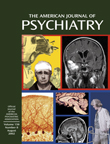Relationship of Enhanced Norepinephrine Activity During Memory Consolidation to Enhanced Long-Term Memory in Humans
Abstract
OBJECTIVE: The purpose of this study was to investigate the effect of enhanced noradrenergic activity on memory consolidation in humans. METHOD: Thirty healthy subjects (21 men and nine women) viewed a series of 12 slides that depicted an emotionally arousing story. Five minutes after viewing the slides, subjects received either intravenous yohimbine or intravenous placebo in a double-blind randomized fashion. Multiple blood samples were drawn for determining plasma free 3-methoxy-4-hydroxyphenylglycol (MHPG). One week later subjects took a surprise memory test for the slides. RESULTS: There was no significant difference in memory score between yohimbine and placebo groups. Linear regression revealed a significant effect of MHPG on memory score for the group as a whole (subjects who had received yohimbine and those who had received placebo) and for the placebo group alone. CONCLUSIONS: These findings strengthen support for the hypothesis that enhanced memory for emotionally arousing events in humans depends critically on postlearning adrenergic modulation.



